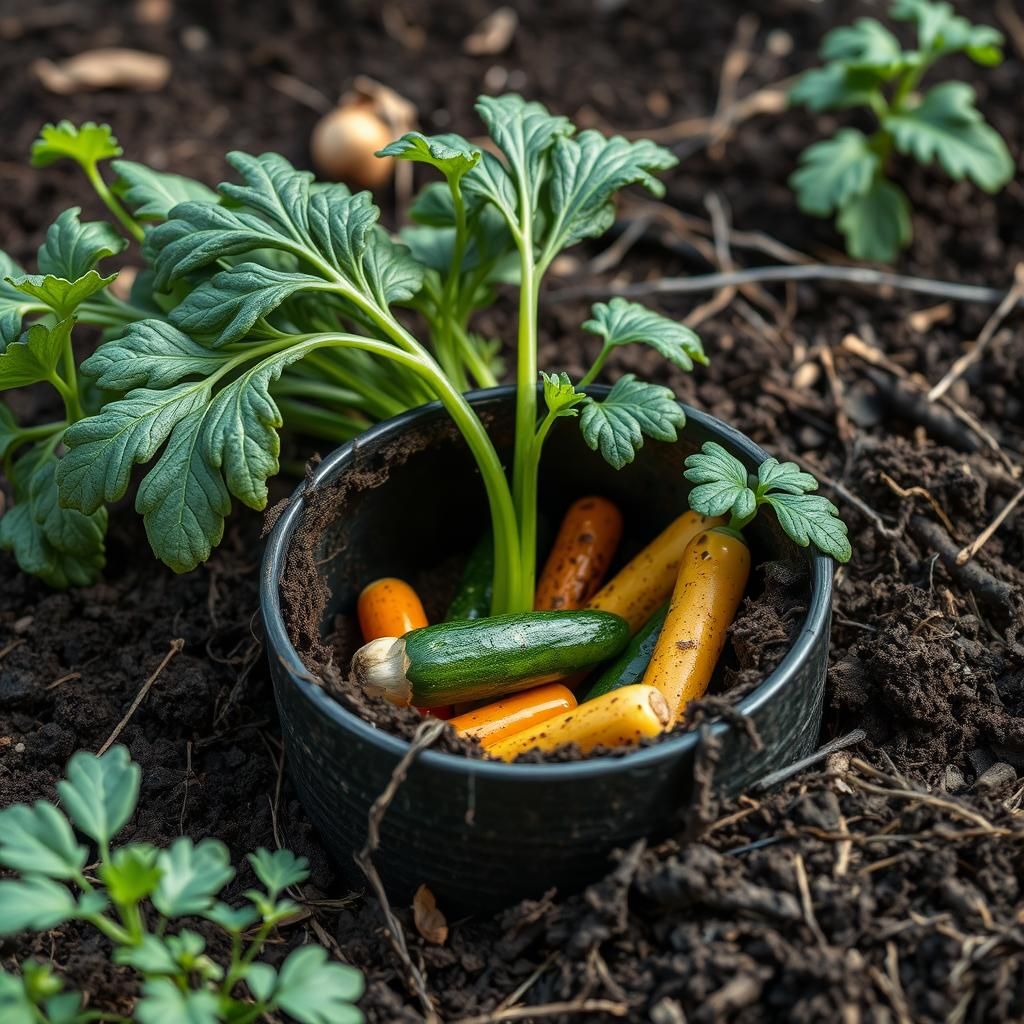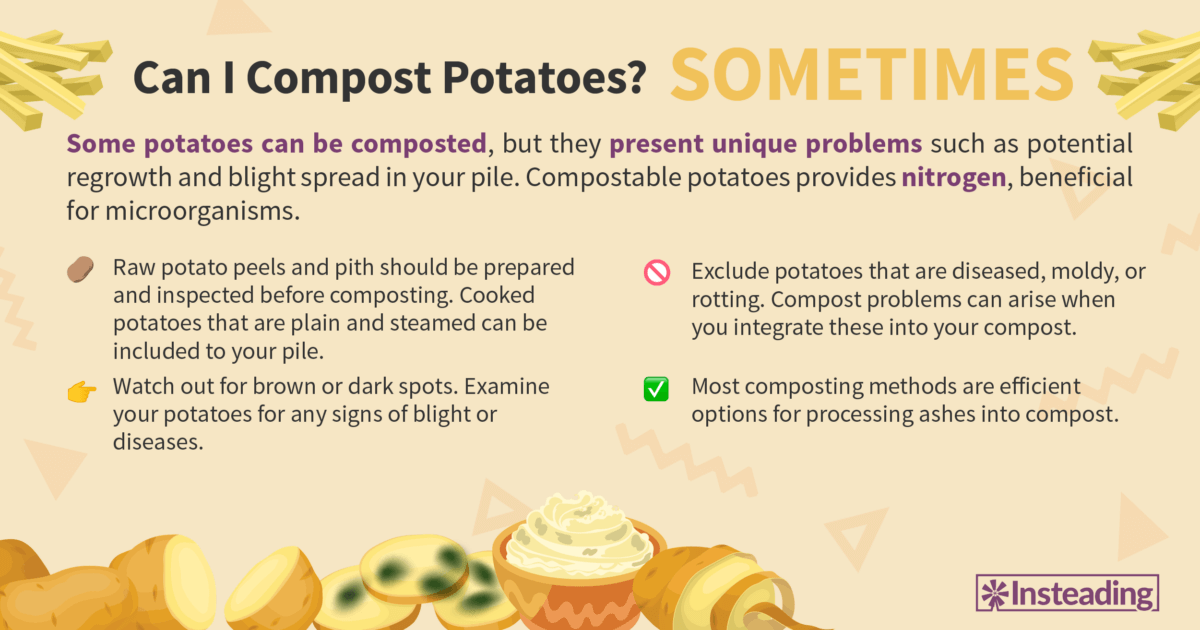Can I Put Cooked Vegetables in My Compost Pile? Tips for Successful Composting

Composting is a popular and eco-friendly way to recycle organic waste, but many people wonder about the specifics of what can be included in their compost piles. One common question is whether cooked vegetables are a suitable addition. Understanding the decomposition process and the impact of cooked food on your compost is essential for successful composting. In this article, we will explore the pros and cons of adding cooked vegetables to your compost pile, offering practical tips to maintain a healthy compost system. Discover how you can effectively reduce waste while creating nutrient-rich soil for your garden.
Can Cooked Vegetables Be Added to Your Compost Pile?
Yes, you can add cooked vegetables to your compost pile, but there are some important considerations to keep in mind. Cooked vegetables can decompose and provide essential nutrients to the compost, similar to raw vegetable scraps. However, since they may contain oils, sauces, or seasonings, these additives can potentially attract pests or create odors during the composting process. It is best to avoid adding foods that are high in fat or processed. Instead, focus on plain, unseasoned vegetables to achieve the best results while maintaining an efficient compost environment.
Benefits of Adding Cooked Vegetables
Adding cooked vegetables to your compost pile can contribute to a healthier compost by increasing the variety of organic matter. The additional nutrients from cooked vegetables—such as vitamins and minerals—can help nourish the soil when the compost is used. Furthermore, these items can speed up the decomposition process, as they may break down faster than raw materials due to their soft texture.
Potential Risks of Cooked Vegetables
While there are benefits, there are also potential risks associated with composting cooked vegetables. They can attract pests like rodents or insects, especially if they are mixed with ingredients that contain fats or sugars. Moreover, any seasonings or sauces can disrupt the balance of your compost and lead to unpleasant odors. Therefore, caution should be taken to avoid adding vegetables that have been heavily processed or seasoned.
Best Practices for Composting Cooked Vegetables
To safely compost cooked vegetables, adhere to best practices that include cutting the items into smaller pieces to facilitate faster decomposition. Select vegetables that are free from any additives and avoid starches like potatoes or rice, as they can also lead to pest issues. It is advisable to layer the cooked vegetables among browns like dried leaves or cardboard to maintain ideal aeration and moisture balance.
Comparing Cooked vs. Raw Vegetables in Composting
When comparing cooked to raw vegetables, raw options are generally more preferable for composting. Raw vegetable scraps tend to have a high water content, making them ideal for maintaining moisture levels in the compost pile. Conversely, cooked vegetables may have a denser texture and less moisture, which can hinder air circulation. However, when prepared correctly, cooked vegetables can still be beneficial but should be used sparingly.
Table: Suitable Cooked Vegetables for Composting
| Cooked Vegetable | Comments |
|---|---|
| Broccoli | Good for compost, avoid excessive seasoning. |
| Carrots | Versatile, breaks down easily. |
| Potatoes | Not recommended due to starch content. |
| Spinach | Breaks down quickly, beneficial to compost. |
| Rice | Not recommended, can attract pests. |
Why can't you put cooked food in compost?

Cooked food should generally not be added to compost for several reasons, primarily due to potential complications that arise during the composting process. Here are the main reasons why cooked food can be problematic:
1. Pest Attraction: Cooked foods, especially those that contain fats, oils, and sugars, can attract various pests, such as rodents and insects. These pests not only disrupt the composting process but can also lead to infestations that could extend beyond the compost pile.
2. Odor Issues: The breakdown of cooked food can lead to the production of unpleasant odors. When food decomposes, it can emit strong smells, which can be off-putting and might indicate issues within the compost pile, such as anaerobic conditions that could harm the composting process.
3. Indicator of Disease: Cooked food can carry pathogens that survived the cooking process if it hasn't been stored or handled properly. Introducing such pathogens into a compost pile can potentially contaminate the compost and create health risks when the compost is later used in gardens.
4. Nutritional Imbalance: Cooked food often has a different nutrient composition compared to raw plant material. Adding these types of food may result in an imbalance in the compost pile, affecting the overall breakdown and nutrient cycling that occurs naturally.
5. Increased Complexity: The breakdown of cooked food can complicate the composting process. Unlike raw food waste, cooked food often breaks down more slowly and may require specific conditions to decompose properly, which can hinder the efficiency of the composting system.
Pest Attraction
Cooked food tends to have higher amounts of fats and sugars, which can be very appealing to a variety of pests.
See also:
- Rodents are drawn to the smell and can cause significant disruption.
- Insects such as flies and ants may invade the compost pile, leading to cleanliness issues.
- Pest infestations can extend beyond compost, affecting the surrounding area.
Odor Issues
The decomposition of cooked food can result in strong odors that are unpleasant and can signal problems within the compost pile.
- Unpleasant smells can deter people from using compost.
- Foul odors may indicate anaerobic conditions, which are inefficient for composting.
- Strong odors can attract unwanted wildlife and pests.
Indicator of Disease
Cooked food can harbor pathogens if not properly stored or handled, which poses health risks.
- Introducing pathogens can contaminate the compost.
- Using such compost in gardens may pose health risks to plants and humans.
- Proper management techniques are required to mitigate risks when cooked food is present.
Nutritional Imbalance
Adding cooked food can disrupt the nutritional balance of the compost pile.
- Cooked food contains different nutrients compared to raw food waste.
- This imbalance can affect the overall effectiveness of the composting process.
- Inconsistent nutrients can impact the quality of the compost produced.
Increased Complexity
Cooked food can complicate the composting process due to its different breakdown requirements.
- Cooked food may take longer to decompose compared to raw food waste.
- Specific moisture and temperature conditions are often needed for proper breakdown.
- This added complexity can reduce the efficiency of the composting system.
Can cooked potatoes go in compost?

Cooked potatoes can technically go in compost, but there are several factors to consider. While they are organic material, there are potential drawbacks to composting them. Cooked potatoes may attract pests and create odors, which can lead to issues in your compost pile. If you decide to compost them, it's important to do so in moderation and to be mindful of the overall balance of your compost.
Benefits of Composting Cooked Potatoes
Composting cooked potatoes can have some positive aspects if managed properly. They add valuable nutrients to the compost pile and can help improve soil health.
- Nutrient-Rich Source: Cooked potatoes are rich in carbohydrates and can contribute to the nutrient content of the compost.
- Soil Improvement: They can enrich the soil with essential nutrients, supporting plant growth when used properly.
- Moisture Retention: Cooked potatoes can help retain moisture in the compost pile, which is beneficial for the composting process.
Potential Issues with Composting Cooked Potatoes
While there are benefits, composting cooked potatoes can lead to certain problems that gardeners should be aware of.
- Pest Attraction: Cooked food, including potatoes, can attract pests like rats and raccoons if the compost pile is not properly managed.
- Bad Odors: They can produce unpleasant odors as they decompose, especially if not mixed well with other compost materials.
- Imbalance in Compost: Adding too many cooked potatoes can disrupt the carbon-to-nitrogen ratio, which is crucial for effective composting.
Best Practices for Composting Cooked Potatoes
If you choose to compost cooked potatoes, there are certain practices that can optimize the process and minimize potential issues.
- Chop Them Up: Cutting cooked potatoes into smaller pieces can speed up decomposition.
- Mix with Dry Materials: Balance the moisture content by mixing cooked potatoes with dry, carbon-rich materials like leaves or straw.
- Limit Quantity: Only compost small amounts of cooked potatoes to maintain a healthy compost environment.
Alternatives to Composting Cooked Potatoes
If you are concerned about the drawbacks of composting cooked potatoes, there are alternative disposal methods to consider.
- Feed Animals: Cooked potatoes can be fed to certain animals, such as chickens or pigs, as part of their diet.
- Kitchen Waste Collection: Check if your local municipality has a kitchen waste collection service that handles cooked foods.
- Municipal Composting Programs: Some local composting programs accept cooked food waste specifically designed for processing.
Composting Cooked Potatoes with Other Kitchen Scraps
Combining cooked potatoes with other kitchen scraps can improve the composting process and reduce odor issues.
- Diverse Kitchen Scraps: Mix cooked potatoes with vegetable peels, coffee grounds, and fruit scraps to create a balanced compost mixture.
- Aeration: Regularly aerate your compost pile to maintain airflow, which helps manage odors and speed up decomposition.
- Monitor Temperature: Keep an eye on the temperature of your compost pile, as higher temperatures can help control pathogens and pests.
Can you put cooked tomatoes in compost?

Yes, you can put cooked tomatoes in compost, but there are some important considerations to keep in mind. Cooked tomatoes may decompose more rapidly than raw tomatoes due to the absence of tougher skin and seeds that often delay the breakdown process in composting. However, when adding cooked tomatoes to compost, it’s essential to ensure that they do not contain any ingredients that could harm your compost or attract unwanted pests.
Benefits of Adding Cooked Tomatoes to Compost
Adding cooked tomatoes to compost can provide several benefits:
See also:
- Nutrients: Cooked tomatoes are rich in nutrients, including potassium and phosphorus, which can enhance the fertility of your compost.
- Accelerated Decomposition: Since cooked tomatoes are softer, they decompose faster than raw ones, which can help speed up the composting process.
- Organic Matter: They contribute valuable organic matter to your compost, improving soil structure and moisture retention.
Considerations Before Composting Cooked Tomatoes
Before adding cooked tomatoes to your compost, consider the following factors:
- Additional Ingredients: Ensure that the tomatoes do not contain harmful ingredients such as oils, cheeses, or certain seasonings that can disrupt the composting process.
- Pest Attraction: Cooked tomatoes may attract pests like rodents or flies, so it's advisable to bury them within the compost pile to deter these animals.
- Temperature Control: Monitor the temperature of your compost pile appropriately, as higher temperatures can help in breaking down cooked items more efficiently.
How to Incorporate Cooked Tomatoes into Compost
To effectively incorporate cooked tomatoes into your compost, follow these steps:
- Chop the Tomatoes: If the cooked tomatoes are large, chopping them into smaller pieces can facilitate faster decomposition.
- Mix Well: Combine them evenly with other compost materials to promote a balanced composting environment.
- Balance with Browns: Add dry materials such as leaves or straw to balance the moisture content and carbon-nitrogen ratio of your compost.
Potential Drawbacks of Composting Cooked Tomatoes
There are a few potential drawbacks associated with composting cooked tomatoes:
- Odor Issues: If not composted correctly, cooked tomatoes can produce odors that may attract pests.
- Imbalance in Compost: Too many cooked tomatoes can create an excess of nitrogen, leading to an imbalanced compost mixture.
- Fungal Growth: The moisture content from cooked tomatoes can promote fungal growth in certain conditions, which might not be desirable for all composters.
What Not to Compost with Cooked Tomatoes
Certain items should never be composted alongside cooked tomatoes to avoid negative consequences. Keep these items in mind:
- Meat and Dairy Products: These can attract pests and create odors.
- Oily Foods: Cooking oils can disrupt the composting process.
- Processed Foods: Items containing preservatives or chemicals may harm beneficial microbes in your compost.
Can you throw cooked food in a compost bin?

Yes, you can throw cooked food in a compost bin, but there are several important considerations to keep in mind. Composting cooked food can attract pests and create odors if not managed properly. However, when done correctly, composting cooked food can contribute valuable nutrients to your compost mix.
Benefits of Composting Cooked Food
Composting cooked food can be beneficial in various ways:
- Nutrient-Rich Addition: Cooked food often contains essential nutrients that can enhance the compost quality.
- Reduced Food Waste: Recycling cooked food into compost helps diminish the amount of food waste that ends up in landfills.
- Improved Soil Quality: The breakdown of cooked food materials can lead to improved soil texture and fertility.
Pests and Odor Management
One of the main challenges with composting cooked food is the potential for attracting pests and creating odors.
- Covering Food Waste: Always cover cooked food with carbon-rich materials like leaves or straw to minimize odors.
- Balance Compost Ingredients: Ensure a balanced mix of greens (nitrogen-rich) and browns (carbon-rich) to maintain a healthy compost pile.
- Choose Small Quantities: Limit the amount and frequency of cooked food added to avoid overwhelming the compost system.
Types of Cooked Foods to Avoid
Not all cooked foods are suitable for composting. Some should be avoided due to their composition:
- Oily Foods: Foods high in oil or fats can attract pests and slow down the composting process.
- Dairy Products: Cheese, milk, and other dairy can lead to foul odors and pest issues if not composted carefully.
- Meat and Fish: These can attract unwanted animals and require specific management techniques if included in compost.
Best Practices for Composting Cooked Food
To successfully incorporate cooked food into your compost, follow these best practices:
- Chop Food into Small Pieces: This helps speed up decomposition and reduces the chance for pests.
- Mix with Other Compost Materials: Combine cooked food with dry leaves, paper, or other brown materials to balance the compost.
- Maintain Proper Moisture Levels: Ensure the compost is moist but not too wet to encourage decomposition without creating anaerobic conditions.
Conclusion on Cooked Food Composting
While it might seem tempting to toss any leftover cooked food into a compost bin, understanding the nuances involved will ensure a successful composting process. Composting requires attention to balance, pest management, and ingredient selection to produce high-quality compost that benefits your garden.
Questions from Our Readers
Can I add cooked vegetables to my compost pile?
Yes, you can add cooked vegetables to your compost pile, but it is advisable to do so in moderation. These vegetables may contain oils, spices, or sauces that could attract pests or create odors. It's best to chop them into small pieces to speed up the decomposition process.
What types of cooked vegetables should I avoid in composting?
You should avoid composting cooked vegetables that are high in fat or sugar, such as creamy sauces or sugary casseroles, as these can lead to undesirable smells and attract vermin. Stick to plain, unseasoned cooked vegetables for the best results.
Will composting cooked vegetables harm my compost pile?
Composting cooked vegetables won’t necessarily harm your compost pile if done correctly; however, adding too many can disrupt the balance of greens and browns, leading to a poor composting process. Ensure you maintain proper ratios and mix them well with other compost materials.
See also:
How can I prepare cooked vegetables for composting?
To prepare cooked vegetables for composting, ensure that they are cooled and free from harmful additives like salt or oil. Chop them into small pieces to facilitate decomposition and mix them with your other compost materials to promote a healthy composting environment.

If you want to read more articles like Can I Put Cooked Vegetables in My Compost Pile? Tips for Successful Composting, we recommend you check out our Compost category.
Leave a Reply
Related Articles